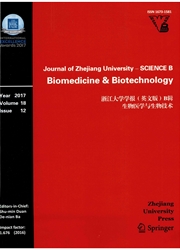

 中文摘要:
中文摘要:
像胰岛素的生长因素 binding-protein-7 (IGFBP7 ) 从我们的以前的结肠的腺癌(CRC ) 被获得;正常 mucosa 抑制减法杂交(SSH ) cDNA 图书馆。由 RT-PCR;免疫组织化学,我们发现 IGFBP7 完了与正常织物相比在 CRC 表示了织物。然而,我们的在里面在 10 根 CRC 房间线执行的 vitro 实验显示出仅仅在 SW480 表示的那 IGFBP7;Caco2 房间线,它暗示了内在的可逆规章的机制。用 methylation 特定的 PCR (MSP ) ;重亚硫酸盐钠 PCR (BSP ) ,我们发现它的表示与 exon1 的 DNA hypomethylation 被联系。这进一步被支持由在里面出现了的 vitro 学习在脱甲基作用代理人 5-aza-2 ′ - deoxycytidine 治疗以后恢复了 IGFBP7 表示。在 IGFBP7 表示之间的关联分析;预后显示在在 CRC 的 IGFBP7 的表示上,织物与赞成幸存相关。通过 transfection 研究的 IGFBP7 的功能的角色的调查证明那 IGFBP7 蛋白质能禁止生长率,减少殖民地形成活动,;在 RKO 导致 apoptosis;SW620 房间,建议它一个潜在的肿瘤压制或在颜色的蛋白质表面的致癌作用。在结论,我们的学习清楚地证明 IGFBP7 玩一个潜在的肿瘤压制或对颜色的角色表面的致癌作用;它的表示在 1 上与前的 DNA hypomethylation 被联系。
 英文摘要:
英文摘要:
Insulin-like growth factor binding-protein-7 (IGFBP7) was obtained from our previous colonic adenocarcinoma (CRC) and normal mucosa suppression subtraction hybridization (SSH) cDNA libraries. By RT-PCR and immunohistochemistry, we found that IGFBP7 was overexpressed in CRC tissue compared to normal tissue. However, our in vitro experiments performed in 10 CRC cell lines showed that IGFBP7 expressed only in SW480 and Caco2 cell lines, which implied an underlying reversible regulatory mechanism. Using methylation-specific PCR (MSP) and bisulfite sodium PCR (BSP), we found that its expression was associated with DNA hypomethylation of exonl. This was further supported by the in vitro study which showed restored IGFBP7 expression after demethylation agent 5-aza-2'-deoxycytidine treatment. Correlation analysis between IGFBP7 expression and prognosis indicated that overexpression of IGFBP7 in CRC tissue correlated with favourable survival. Investigation of the functional role of IGFBP7 through transfection studies showed that IGFBP7 protein could inhibit growth rate, decrease colony formation activity, and induce apoptosis in RKO and SW620 cells, suggesting it a potential tumor suppressor protein in colorectal carcinogenesis. In conclusion, our study clearly demonstrated that IGFBP7 plays a potential tumor suppressor role against colorectal carcinogenesis and its expression is associated with DNA hypomethylation of exon 1.
 同期刊论文项目
同期刊论文项目
 同项目期刊论文
同项目期刊论文
 Methylation patterns of IGFBP7 in colon cancer cell lines are associated with levels of gene express
Methylation patterns of IGFBP7 in colon cancer cell lines are associated with levels of gene express Tumor suppressor gene insulin-like growth factor binding protein-related protein 1 (IGFBP-rP1) induc
Tumor suppressor gene insulin-like growth factor binding protein-related protein 1 (IGFBP-rP1) induc 期刊信息
期刊信息
